This exploration of Masada reveals its unexpected absence in the Bible, igniting curiosity about its historical and spiritual significance.
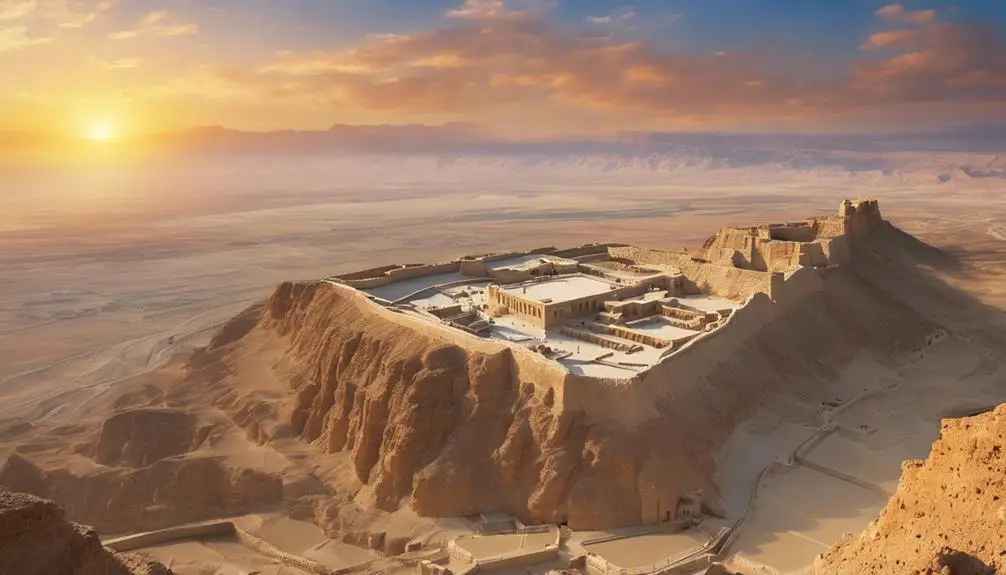
Masada in the Bible
You've heard of Masada's legendary siege, its unwavering defenders, and its tragic end, but how much do you truly know about its biblical connections?
Despite common beliefs, Masada's story unfolds in the interstices of history and scripture, not within the pages of the Bible itself. This distinction invites you to explore the misconceptions surrounding its scriptural references and understand its profound significance in Jewish lore.
As we unravel the layers of Masada's past, you'll discover why this ancient fortress continues to captivate and its role in shaping modern Jewish identity.
Let's embark on this journey to uncover the truths and myths of Masada's biblical saga.
Key Takeaways
- Masada is not mentioned in biblical texts, highlighting the importance of historical context over scriptural references.
- Misconceptions may arise from translation variations, underscoring the need for careful interpretation.
- The site's significance extends beyond biblical narratives, symbolizing Jewish resilience and defiance.
- Understanding Masada's role in Jewish lore and culture is crucial, even in the absence of direct biblical mentions.
The Historical Context of Masada
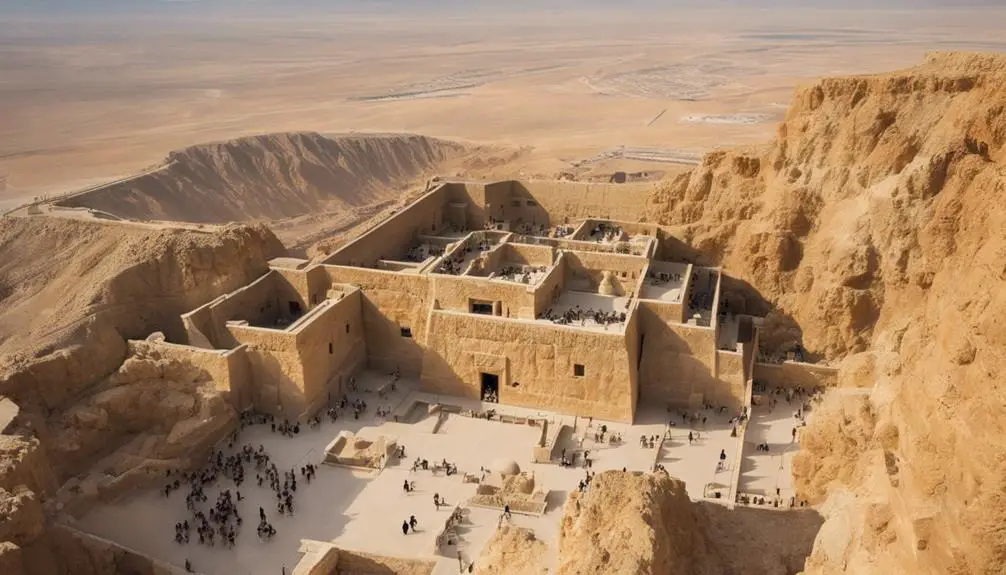
Masada, an ancient fortress in the Judean Desert, bears witness to the complex socio-political dynamics of the first century CE, particularly during the Jewish-Roman War. You'll find that Roman policy and Herodian architecture significantly shaped its historical context. The fortress, originally built by Herod the Great, showcases the strategic military architecture characteristic of the period, reflecting the broader Roman imperial strategy in the region.
Herodian architecture, with its massive fortifications, palatial complexes, and ingenious water collection systems, underlines the dual nature of Masada as both a luxurious palace and a formidable stronghold. This architectural style not only demonstrates the technical prowess and aesthetic sensibilities of the era but also serves as a tangible representation of Roman and Herodian power.
Roman policy, aimed at consolidating control over Judea, played a crucial role in the site's history. The fortress became a symbol of resistance during the Jewish-Roman War, embodying the conflict between Roman imperial ambitions and Jewish autonomy. Masada's eventual fall to Roman forces in 73 CE marked a significant, tragic end to the rebellion, illustrating the overwhelming might of the Roman Empire and the limits of revolt in the face of such power.
Misconceptions About Biblical References
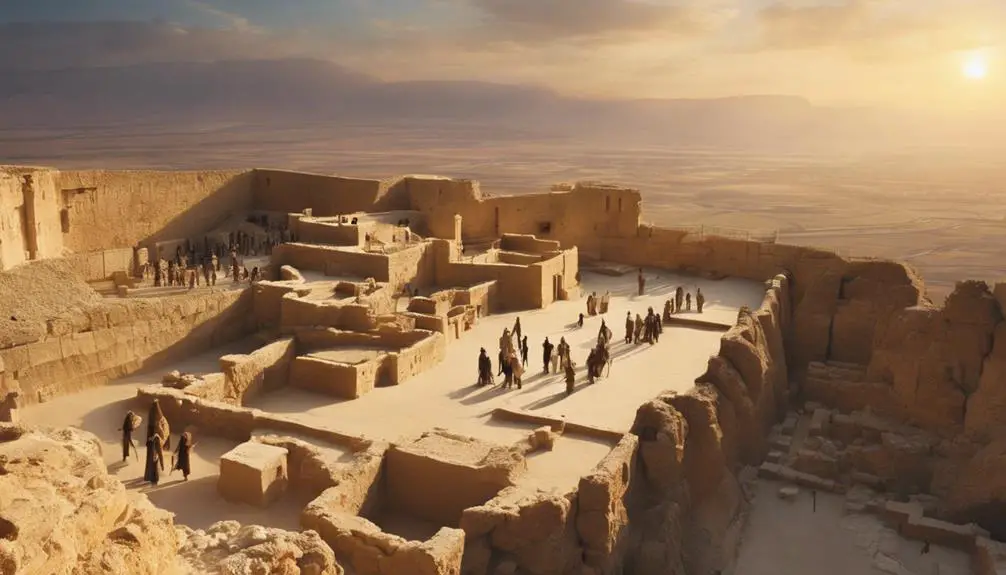
While exploring the historical context of Masada, it's crucial to address common misconceptions regarding its mention—or notable absence—in biblical texts. Many believe that Masada holds a significant place within the Scriptures; however, a closer examination reveals that references directly pointing to Masada in canonical texts are non-existent. This absence often leads to confusion and misinterpretation among scholars and enthusiasts alike.
Understanding the nuances of scriptural accuracy and translation variations is essential in navigating these misconceptions. The table below outlines some common misunderstandings related to Masada and biblical references:
Misconception |
Fact |
Importance |
|---|---|---|
Masada is frequently mentioned in the Bible |
Masada does not directly appear in biblical texts |
Highlights the need for careful scriptural interpretation |
All biblical texts are uniform in references |
Translation variations can lead to differing interpretations |
Emphasizes the complexity of scriptural accuracy |
The absence of Masada undermines its historical significance |
Historical significance is not solely determined by biblical mention |
Encourages a broader perspective on historical analysis |
Masada's Significance in Jewish Lore
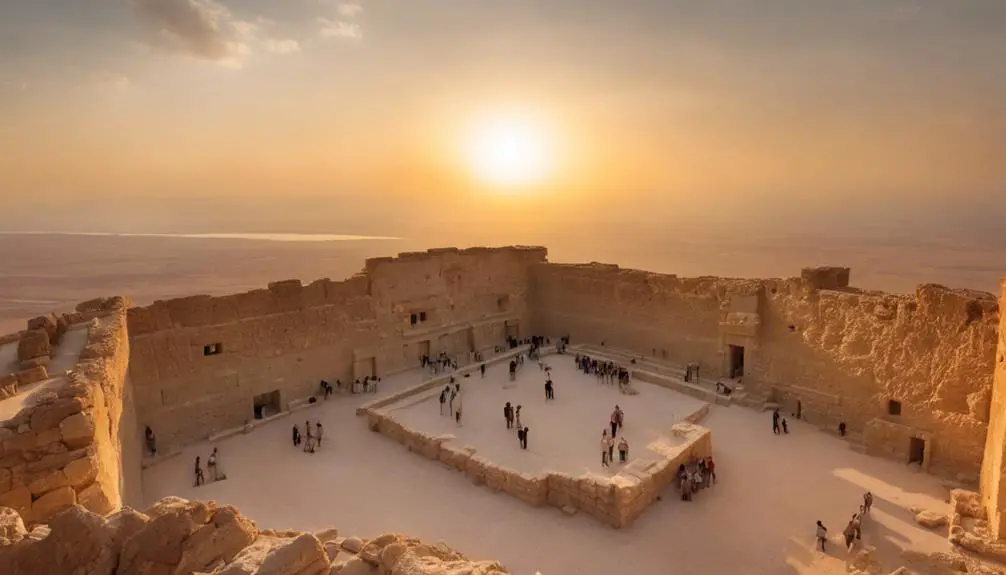
Despite its absence in canonical biblical texts, the fortress of Masada embodies a profound narrative within Jewish lore, symbolizing resilience and defiance against oppression. This desert stronghold, perched atop a rugged plateau, has transcended its historical roots to become a symbol of heroic symbolism in the face of insurmountable odds. It's not just a site of ancient ruins; Masada represents a cultural pilgrimage for those who wish to connect with a pivotal moment in Jewish history.
The significance of Masada in Jewish lore can be highlighted by:
- Its embodiment of the spirit of freedom against tyranny.
- The role it plays in memorializing those who chose death over enslavement.
- Its influence on modern Israeli identity and military ethos.
- The site as a destination for cultural pilgrimage, drawing visitors who seek to honor the resilience of the Jewish people.
Analyzing Masada through a scholarly lens, it's clear that its impact extends far beyond the historical events that unfolded there. It serves as a powerful reminder of the enduring nature of cultural memory and the importance of preserving stories of resistance and survival for future generations.
The Siege of 73-74 CE Explained
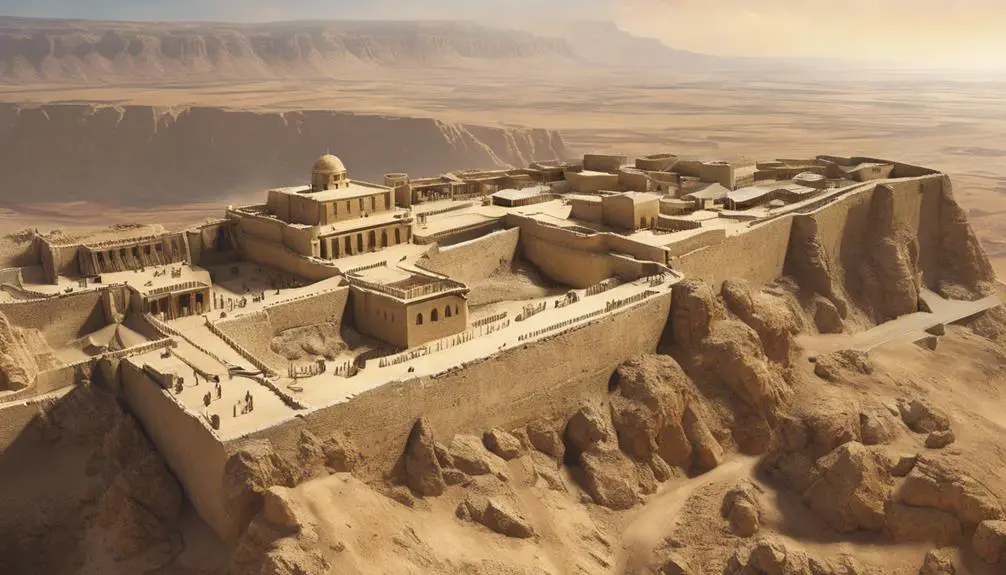
In 73-74 CE, Roman forces laid siege to the fortress of Masada, marking a decisive moment in the First Jewish-Roman War. This event showcased a stark contrast between Roman tactics and rebel strategies, highlighting the ingenuity and determination of both sides.
Roman Tactics |
Rebel Strategies |
|---|---|
Engineering marvels |
Utilization of the landscape |
Psychological warfare |
Morale and solidarity |
Siege technology |
Guerrilla tactics |
The Romans, known for their military ingenuity, employed advanced siege technology and engineering marvels to break the rebels' defenses. Their approach included constructing a massive ramp to breach Masada's formidable walls. This feat of engineering was not only a testament to Roman military prowess but also a psychological tactic meant to demoralize the rebels.
On the other hand, the rebels employed strategies that leveraged the natural landscape of Masada to their advantage. Their knowledge of the terrain allowed for effective guerrilla tactics, making the Roman advance costly. The rebels' morale and solidarity were crucial in sustaining their resistance, showcasing their determination to hold out against a vastly superior force.
This conflict between Roman tactics and rebel strategies at Masada remains a symbol of resistance and determination, reflecting the complexities of ancient warfare.
Archaeological Findings and Insights

Archaeological excavations at Masada have unearthed numerous artifacts, offering profound insights into the lives of those who endured the siege. Through meticulous pottery analysis and examination of construction techniques, scholars have pieced together a detailed picture of daily life, military strategy, and architectural innovation at this ancient fortress.
Pottery analysis, in particular, has played a crucial role in understanding the temporal layers of Masada's occupation. By studying the style and composition of ceramic fragments, archaeologists can date the various phases of habitation and use. Similarly, the investigation of construction techniques has revealed much about the ingenuity and adaptability of Masada's inhabitants. These insights include:
- The evolution of water storage systems, crucial for survival in the arid environment.
- Fortification methods that maximized the natural defensibility of the site.
- Residential areas that reflect both the communal and hierarchical aspects of society.
- Public buildings and spaces that suggest a complex social and religious life.
This scholarly approach ensures that conclusions drawn from archaeological evidence are both credible and enlightening, offering a comprehensive understanding of Masada's historical significance beyond the legendary narrative of fortitude and tragedy.
Masada in Modern Jewish Identity
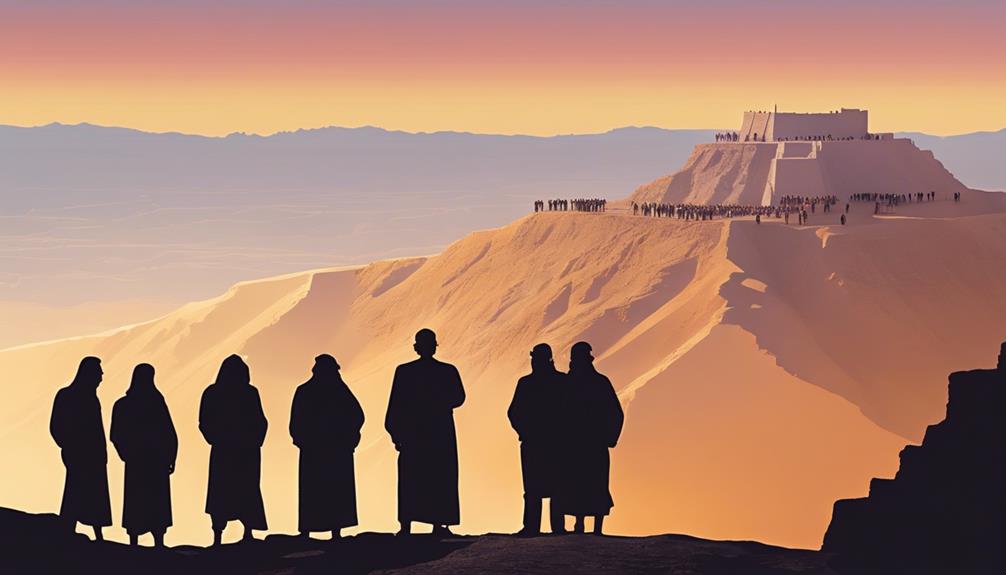
Masada's legacy, intertwined deeply with the formation of modern Jewish identity, serves as a powerful symbol of resilience and freedom against oppression. This ancient fortress, perched atop a rugged desert plateau, has transcended its historical confines to become emblematic of the enduring spirit of the Jewish people. Its story, one of defiant resistance against a vastly superior Roman force, resonates profoundly within the narrative of Zionist symbolism. You'll find that Masada's tale isn't just a recounting of a siege but a foundational myth that has been instrumental in shaping the collective consciousness of the Jewish nation.
The educational impact of Masada's legacy on Jewish identity can't be overstated. It's woven into the curriculum of schools, serving as a testament to the virtues of courage and sacrifice in the face of insurmountable odds. Through the lens of Zionist symbolism, Masada's narrative is employed to foster a sense of national pride and unity. It reinforces the importance of self-determination and the willingness to fight for one's freedom and rights. Thus, Masada stands not merely as a historical site but as a beacon of inspiration, embodying the indomitable will to survive and thrive against all odds.
Frequently Asked Questions
How Has the Story of Masada Been Interpreted in Christian Theological Discussions or Depicted in Christian Art?
You won't find much about Masada in Christian theological discussions or its depiction in Christian art. The story, primarily a Jewish narrative, hasn't significantly influenced Christian eschatology or Masada iconography within the Christian tradition.
Instead, Christian art and theology have focused on themes and stories directly from the Bible, leaving Masada's tale more to historical and cultural discussions rather than adopting it into theological debates or artistic representations within Christianity.
Are There Any Specific Rituals or Commemorations Practiced Today That Directly Reference Masada's Biblical or Historical Narratives?
You won't find specific rituals or commemorations that directly reference Masada's narratives in today's practices. However, Masada archaeology has shed light on its past, and occasionally, there are Siege reenactments that bring its history to life.
These events serve more as educational tools or tourist attractions rather than religious or historical commemorations. They aim to connect people with Masada's story, analyzing its significance without tying it directly to biblical or traditional religious practices.
How Do Contemporary Jewish Scholars Reconcile the Story of Masada With Modern Values of Peace and Diplomacy?
You'd find contemporary Jewish scholars approach reconciling Masada's narrative with modern values through a nuanced lens, focusing on siege ethics and psychological resilience. They often emphasize the historical context, analyzing how decisions made during desperate times reflect broader ethical dilemmas.
Has Masada Been Referenced or Symbolized in Major Global Political or Social Movements Outside of Israel?
Yes, Masada's symbolism has resonated beyond Israel, impacting global political and social movements. It's often invoked as a symbol of defiance and resilience.
For instance, movements fighting against oppression or seeking autonomy have drawn parallels with Masada's stand against Roman siege. This narrative of resistance has inspired activists and leaders worldwide, embedding Masada's legacy into a broader context of struggle for freedom and against tyranny, showcasing its global impacts.
What Role Does Masada Play in Educational Curriculums Around the World, Particularly in Non-Jewish Settings?
You're opening a can of worms when you explore Masada's role in global educational curriculums, especially outside Jewish contexts. This ancient fortress story isn't just a tale of siege and survival; it's a canvas for cultural adaptations.
Curriculum integration of Masada varies widely, reflecting diverse interpretations of its historical and moral lessons. Educators worldwide navigate its complex narrative, weaving it into discussions on resilience, freedom, and the ethics of resistance in a scholarly, objective manner.
Conclusion
You've ventured through Masada's storied past, unraveling myths from biblical inaccuracies and diving into the heart of Jewish heritage. Amidst the ruins, archaeology whispers tales of bravery, while modern identity clings to these narratives, crafting a bridge between ancient valor and contemporary resilience.
This juxtaposition, between what was unearthed and what endures in spirit, highlights Masada's timeless allure. It's not just about a siege or artifacts; it's a testament to enduring identity, sculpted by history and embraced by future generations.

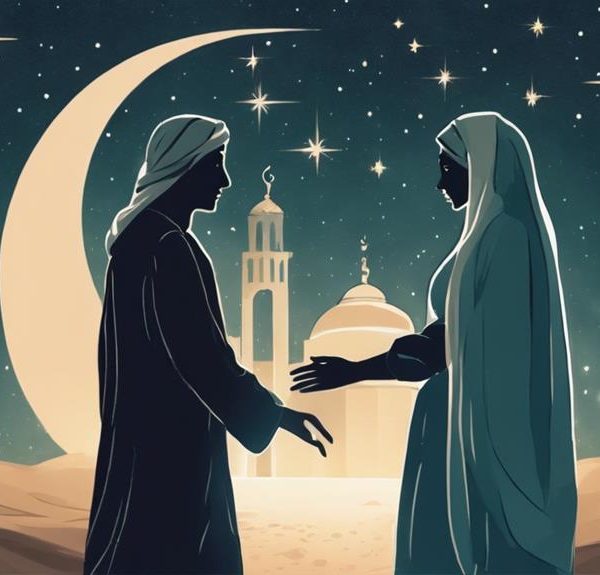

Sign up